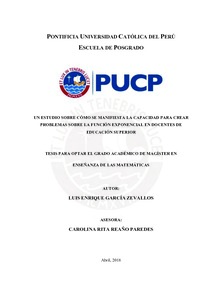| dc.contributor.advisor | Reaño Paredes, Carolina Rita | |
| dc.contributor.author | García Zevallos, Luis Enrique | es_ES |
| dc.date.accessioned | 2018-06-18T19:35:19Z | es_ES |
| dc.date.available | 2018-06-18T19:35:19Z | es_ES |
| dc.date.created | 2018 | es_ES |
| dc.date.issued | 2018-06-18 | es_ES |
| dc.identifier.uri | http://hdl.handle.net/20.500.12404/12163 | |
| dc.description.abstract | En la presente investigación, se estudia cómo se manifiesta la capacidad para crear problemas
matemáticos sobre la función exponencial en profesores de educación superior. La problemática
que justifica este trabajo tiene su origen en las dificultades que experimentan, con mucha
frecuencia, estudiantes universitarios de las especialidades de letras para comprender el
concepto de la función exponencial y, por ende, para modelar matemáticamente una situación
real con características exponenciales. En consecuencia, resulta necesario que los docentes de
educación superior desarrollen la capacidad para crear problemas sobre situaciones reales y
significativas para sus estudiantes, ya sea adaptándolos de los libros de texto o elaborándolos
desde situaciones cotidianas. Esta investigación tiene, por objetivo, profundizar en el estudio
de la capacidad del docente para crear problemas sobre la función exponencial, y se basa en el
Enfoque de creación de problemas (Malaspina, 2017), que propone el uso de las estrategias
“Episodio, problema Pre, problema Pos” (EPP) y “Situación, problema Pre, problema Pos”
(SPP), las cuales permiten crear problemas más didácticos y con mayor demanda cognitiva.
Para ello, se analizan problemas creados por docentes de matemáticas y dirigidos a estudiantes
de carreras de letras en una universidad peruana, mediante los criterios de creatividad
empleados por Malaspina (2014b): fluidez, flexibilidad y originalidad, los cuales permiten
describir la forma en que la creatividad se manifiesta. Del análisis se observa que las estrategias
de creación de problemas facilitan las modificaciones con fines didácticos, promoviendo la
fluidez de ideas e incentivando la flexibilidad de pensamiento. Se puede concluir, entonces, que
las estrategias EPP y SPP permiten mejorar la creatividad en los docentes universitarios y les
dan instrumentos de cambio para mejorar un problema dado, ya sea enfocando su sentido
didáctico o ampliando su demanda cognitiva. | es_ES |
| dc.description.abstract | In this research, it is studied how the ability to pose mathematical problems about the
exponential function in higher education professors is manifested. The problem this work seeks
to address has its origin in the difficulties experienced, very often, by university students of
Liberal Arts programs to comprehend the concept of the exponential function and, therefore, to
mathematically model a real-world situation with exponential characteristics. Consequently, it
is necessary that teachers of higher education develop the ability to create problems about real
and meaningful situations for their students, either by adapting them from textbooks or by
elaborating them from everyday situations. This research aims to deepen in the study of the
ability of the professor to create problems about the exponential function, and it is based on the
Problem Posing Approach (Malaspina, 2017), which proposes the use of the strategies
“Episode, Pre-problem problem, Post-problem problem” (EPP) and “Situation, Pre-problem
problem, Post-problem problem” (SPP), which allow to pose more didactic problems and with
greater cognitive demand. For this purpose, problems created by Mathematics professors and
aimed at students of Liberal Arts programs in a Peruvian university are analyzed, through the
creativity criteria used by Malaspina (2014b): fluency, flexibility and originality, which allow
describing the way creativity manifests itself. From the analysis, it is observed that the problem
posing strategies facilitate the modifications with didactic aims, promoting the fluency of ideas
and encouraging the flexibility of thought. It can be concluded, then, that the EPP and SPP
strategies allow to improve the creativity in university professors, giving them instruments of
change to improve a given problem, either focusing on its didactic sense or expanding its
cognitive demand. | es_ES |
| dc.language.iso | spa | es_ES |
| dc.publisher | Pontificia Universidad Católica del Perú | es_ES |
| dc.rights | info:eu-repo/semantics/closedAccess | es_ES |
| dc.subject | Matemáticas--Estudio y enseñanza | es_ES |
| dc.subject | Cálculo | es_ES |
| dc.subject | Profesores universitarios--Investigaciones | es_ES |
| dc.title | Un estudio sobre cómo se manifiesta la capacidad para crear problemas sobre la función exponencial en docentes de educación superior | es_ES |
| dc.type | info:eu-repo/semantics/masterThesis | es_ES |
| thesis.degree.name | Maestro en la enseñanza de las Matemáticas | es_ES |
| thesis.degree.level | Maestría | es_ES |
| thesis.degree.grantor | Pontificia Universidad Católica del Perú. Escuela de Posgrado | es_ES |
| thesis.degree.discipline | Enseñanza de las Matemáticas | es_ES |
| renati.discipline | 199117 | es_ES |
| renati.level | https://purl.org/pe-repo/renati/level#maestro | es_ES |
| renati.type | http://purl.org/pe-repo/renati/type#tesis | es_ES |
| dc.publisher.country | PE | es_ES |
| dc.subject.ocde | https://purl.org/pe-repo/ocde/ford#5.03.01 | es_ES |





